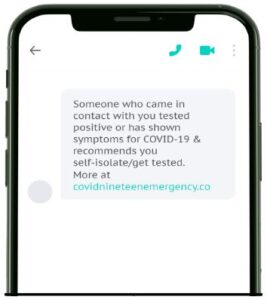Each month we highlight a REAL scam that was submitted to our security team. We highlight these real examples of tactics criminals are using RIGHT NOW, that way you’ll be better prepared when the next scam comes your way.
This month’s submission comes from “Cindy.” Cindy received a text message informing her that she had come into contact with someone testing positive for COVID-19. In the text, she was encouraged to take precautions and click the provided link for more information.
 Do you spot the red flags?
Do you spot the red flags?
The text avoids providing any specific information that may help verify its authenticity. But, even if a text does provide details like your name and location, you should still be skeptical.
The link is fake and will most likely lead to a malicious web page. Avoid clicking any links in text messages from unknown sources.
The text message is using a hot button topic to help initiate activity. This global pandemic is still a prime concern across the globe, so it is very common for criminals to use these popular subjects to peddle their crimes.
Texting scams and others like this have been constant since the global pandemic emerged. Variations of this scam have surfaced and will continue to be updated to better reflect the current trends in our community, Treat unsolicited text messages with extreme caution!
Texting scams are some of the more common scams a criminal can partake in. By using tools or apps, scammers can spoof their phone number and quickly send thousands of fake messages. It all becomes a low risk, high reward option for them, especially with a popular subject matter.
Cindy was wise here and did not click the suspicious link and did not reply to the text. It is best to delete these messages when they come in so that you don’t accidentally click something at a later time. Cindy also informed her friends and family too, as this attack can target anyone!


 Do you spot the red flags?
Do you spot the red flags?


